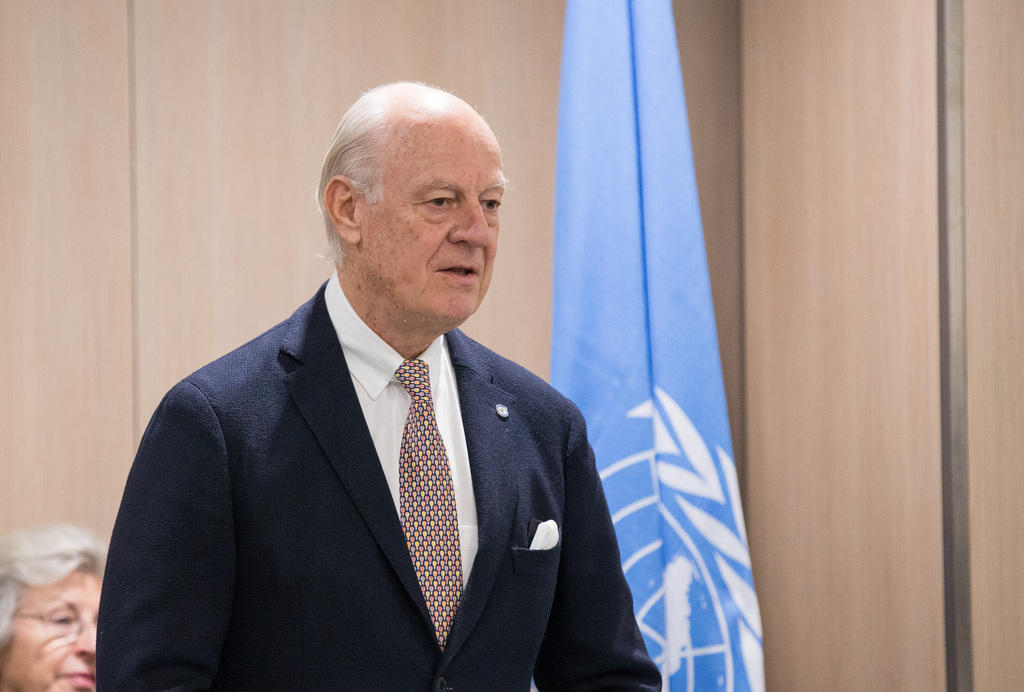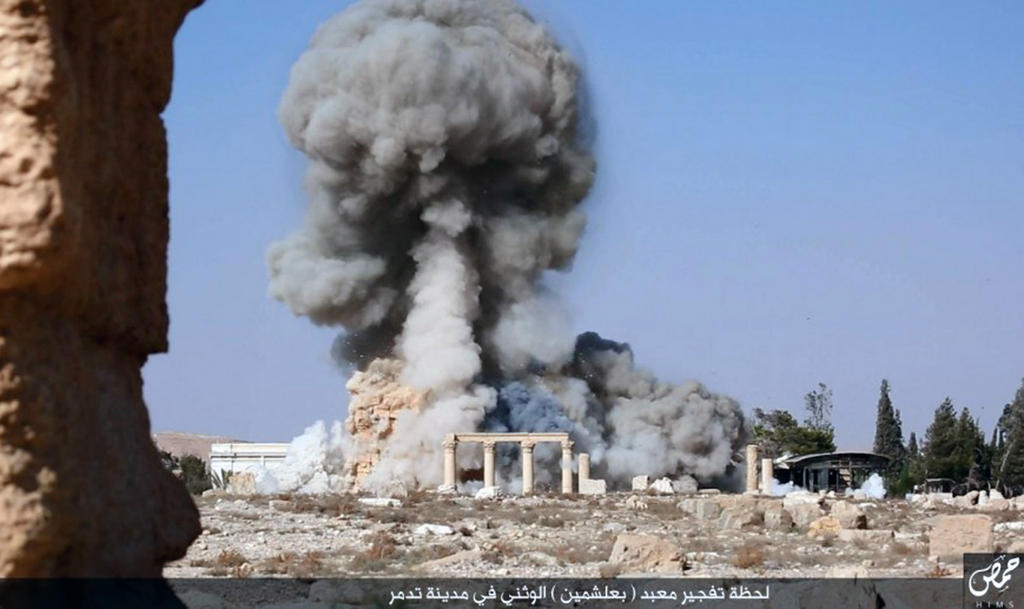Syrian civil society meets in Geneva to discuss peace

With Syria’s war still raging and official peace talks at an impasse, a quiet peace initiative is continuing in Geneva. The Civil Society Support Room, backed by the Swiss and other governments, is seen as a new approach to UN peace and mediation processes.
Room I in the Palais des Nations in Geneva can take up to 71 people. It is wood-panelled, with large tables arranged in a square. The chairs are set so close together that you almost touch your neighbours.
It is here that people like Syrian journalist Belal and peace activist Asma (not her real name) meet at the invitation of the UN to talk for a few days about their country’s future.

More
Syria: what will it take to make peace?
“We want to strengthen the role of civil society as a bridge-builder,” says Salvatore Pedulla, a senior official at the Office of the UN Special Envoy for Syria (OSE). He says one of the main aims is “to get the Syrian parties that are negotiating in Geneva and the broader international community to hear civil society’s voices and aspirations for the future”.
The Civil Society Support Room (CSSR) was designed by the OSE and has been working since 2016. It is implemented by Swiss NGO swisspeaceExternal link and the NOREF Norwegian Centre for Conflict ResolutionExternal link, with funding from Switzerland, Norway, Sweden and the European Union.
Warring parties excluded
But who are Syrian civil society? Those invited include members of NGOs, grassroots movements, humanitarian organisations and women’s groups, as well as academics and former civil servants, working both inside and outside Syria.
“The condition is that the participants want to work for a peaceful solution, even with people who have a different political opinion or come from a different region of Syria,” Pedulla told swissinfo.ch. Members of political parties and conflicting parties taking part in the official peace talks are excluded from these discussions.
“I stand for human rights,” says Asma. “If you don’t share those values, you’re in the wrong place at the CSSR.” Belal agrees that “the focus is on all Syrians and their human rights”, which helps bring people together.
Pedulla says the first day of discussions can be a bit difficult. “Often at first the participants do not want to budge from their positions,” he says. “But their desire for peace through dialogue helps to overcome such differences.”
Everything is up for discussion, he told swissinfo.ch, including legal and constitutional reforms, missing people, detainees and abductees, women’s rights, protection of civilians and humanitarian access. Some topics are suggested by the OSE, others are contributed by the participants themselves.
Many of the participants are at tremendous personal risk for their commitment, and everyone is affected by the horrors of the war. Pedulla recounts that during one round of talks in Geneva, the phone of a participant rang and he learnt that his uncle and father-in-law had died in a strike.
“Such events make the whole thing incredibly real, it’s not just a workshop,” says Pedulla.
The UN Syria envoy Staffan de Mistura has organised talks in Geneva with representatives from the United States, Britain, Saudi Arabia, Jordan, Germany, France and Egypt on September 14. The meeting will take place two days after he meets officials from Russia, Turkey and Iran on September 11-12..
De Mistura is seeking to form a committee of Syrian citizens to draw up the new Syria constitution, after receiving nominations from the Syrian government and the opposition. However, progress has been slow.
Over the past two years the warring parties have frequently travelled to Geneva in a search for agreement on political reforms, a new constitution and new elections. But the UN political process has faded amid major military gains by Syrian President Bashar al-Assad, who has the military backing of Moscow and Tehran, and little US involvement.
Russia, Iran and Turkey have backed parallel Syria peace talks based in the Kazakh capital of Astana which they insist are aimed at reinforcing, rather than undermining the UN process in Geneva.
Concrete results
A total of eight CSSR rounds of talks have so far taken place in Geneva, on the fringes of the official peace talks. More than 400 people have already participated, including more than 100 who have taken part in several rounds. Among the participants are representatives of Syrian networks that comprise over 350 civil society organisations.
Some consultations have also started to take place in Syria’s neighbouring countries, where there are now more than five million refugees. Even during lulls in the formal talks in Geneva, the CSSR team engages Syrians from civil society on pressing issues, including through videoconferences, webcasts and travels to the region.
So what has been achieved? Sometimes there are concrete results. For example, a humanitarian organisation from Raqqa asked for an internet conference with relevant UN members states like Russia and the United States in Geneva about a number of displaced families stuck at a checkpoint. The CSSR team facilitated contacts with relevant diplomatic missions having influence on the parties to the conflict, which allowed this and other humanitarian issues to be resolved.
The CSSR was initially met with distrust on the part of most stakeholders – not just the Assad regime – but Pedulla says the image of Syrian civil society has changed over the past two-and-a-half years.
For many Syrians who had never travelled to Europe and had no experience with international processes, the partnership that OSE established with swisspeace and NOREF has allowed them to better raise their interests and lobby for them. In Geneva, they have the opportunity to meet UN representatives who are involved in the mediation process, ask questions, and – most importantly – bring concerns and ideas to the Special Envoy Staffan de Mistura and his team.
“Many participants would never have had these opportunities if we hadn’t invited them to Geneva,” says Pedulla. “More and more emerging civil society are reaching out to us to express interest in being part of this process.”
More countries are also showing interest in cooperating with Syrian civil society. “The CSSR has become the hub of Syrian civil society,” writes the Swiss foreign ministry, which has so far supported swisspeace with CHF370,000 ($380,000) annually for this project.
What next?
The CSSR is a new approach to UN peace and mediation processes: it is the first time that civil society actors have been invited by the UN from the very start of a formal mediation process. But the situation in Syria and in the refugee camps has hardly improved, and some people are asking whether further CSSR meetings make sense.
“Syrians are exhausted by this horrific conflict,” says Pedulla. “CSSR participants are calling for a political solution, for Syrians to be able to live together in peace and enjoy fundamental rights. They are not giving up and neither should we.”
“In the end,” says Belal, “we Syrian men and women will live together. We must all sit around the same table and draw up a regional plan for the future. It must take into account everyone’s fears and pain.”

More
Archaeologists in Switzerland prepare for post-war Syria

In compliance with the JTI standards
More: SWI swissinfo.ch certified by the Journalism Trust Initiative












You can find an overview of ongoing debates with our journalists here . Please join us!
If you want to start a conversation about a topic raised in this article or want to report factual errors, email us at english@swissinfo.ch.